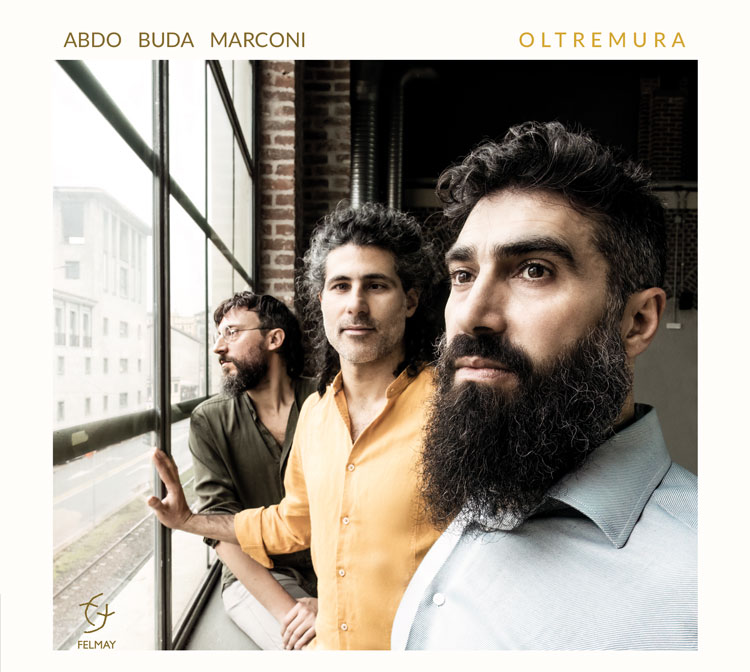Abdo Buda Marconi – Oltremura (Felmay, 2023)
Oltremura, the second album by Ashti Abdo, Manuel Buda, and Fabio Marconi, demonstrates a noticeable maturity right from the opening track. Notably, this growth is evident through the inclusion of four original compositions, marking the trio’s first venture into collective songwriting. These colorful and lovely pieces highlight a diverse and sophisticated compositional style, featuring striking polyrhythms, melancholic ballads, and spirited rhythms.
Furthermore, while the trio’s musical roots lie in the Mediterranean and Middle Eastern traditions, they embark on subtle explorations with a contemporary twist, weaving in elements reminiscent of Jewish nigun and even traces of archaic blues. This intriguing journey unfolds through intricately detailed arrangements, leading the listener along meandering paths that unveil fresh sonic textures and innovative combinations.
The repertoire not only comprises the four original compositions but also encompasses a selection of traditional tunes. Notably, these range from timeless Balkan classics like “Ajde Jano,” rendered with a nearly contrapuntal texture that unexpectedly shifts into a Latin-jazz interlude, to “Trantela,” an Azerbaijani tarantella discovered by the trio thanks to the collaboration with Syrian oud player Orwa Saleh. This piece intriguingly bridges the musical worlds of Southern Italy and the Caucasus.
Ashti Abdo’s solo vocal rendition of “Om,” originally by Kurdish musician Hafez Nazeri, is a captivating reinterpretation. Moreover, Abdo infuses soul into “Dêre Sorê,’ a Kurdish traditional song, where Manuel Buda’s emotive pizzicato cadence blends seamlessly with a spirited, communal sing-along melody.
The interplay among the trio’s musicians is particularly effective, as exemplified in “Bê Sînor.” Here, Fabio Marconi transforms Ashti’s thematic material into a sequence of chords and a walking bassline with a sub-Saharan undertone. This forms the backdrop for pentatonic flights on saz and classical guitar by the other two members, creating a fresh and unexpected musical mood.
From the title track, “Oltremura,” onwards, the Trio crafts a musical realm inhabited by individuals capable of navigating diverse musical landscapes. Their sonic journey takes them from the Middle East to Africa, Southern Italy, and even into the mainstream radio waves. This richly described and presented musical adventure is aptly encapsulated by the notion of Bê Sînor – a world without boundaries.
Line up: Ashti Abdo on saz, tembur, drums, vocal, duduk, digeridoo; Manuel Buda on classical guitar, vocal; and Fabio Marconi on 7-string guitar, fretless guitar, vocal.
The band explains the recording process in the album’s liner notes: “Throughout the spring of 2020, over the period of toughest restrictions, we started six-handed composition of the piece that opens this album and that gives it its title. Thus, it was in full a remote composing, made of exchanging ideas over the phone, musical fragments sent as audio-messages, arrangement simulations, and all the things today’s technology allows us to do. But above all, there were long weeks where what got us up in the morning was the writing of that tune, when almost nothing in our artistic life was left standing; perhaps that’s also why we let this continue up to the approaching summer, that gave us the chance to meet again in person.
“Looking back on that time, we captured a vision: composing that piece was what let us go beyond the walls that were constraining us and physically isolating us, and this made us feel inspired and active despite all.
“This experience was a turning point that maybe would have come anyway, but certainly not that fast, and in such an intense way: during those weeks we found out how much we needed to express ourselves composing entirely original music, and to what extent the chemistry of our Trio makes working with it a thrilling experience.
“This is how A Piedi Nudi and Bê Sînor were created, almost in parallel, then followed by Luminosa Speme. We tried to build as little as possible on the latter, letting it breathe in its simpleness, while the first two were a task full of twists and turns, of trade-offs between the visions of the author of the original themes, and the (often quite different) musical ideas that they elicited in the other two, and of collective engagement in exploring new solutions and tonal mixtures.
“Without any deliberate choice, the Mediterranean, and Middle Eastern matrix (that we feel like home) opened to veiled excursions with a contemporary feel, and references to the Jewish nigun and to archaic blues form.
“Definitely, though, our passion for the research of traditional songs has not ended and never will, along with the urge to compose and re-compose them in new ways inspiring for us. So, the great Balcan classic Ajde Jano (we had fun freely improvising on it for hours) has turned into an almost contrapuntal dialogue between our strings, broken by a sudden Latin jazz sounding interlude.
“Already during the Karsilama tour, we have often been using as an encore a tune that creates an amazing bridge between Southern Italy and Caucasus: Trantela, a tarantella from Azerbaijan, that we discovered thanks to Syrian oud player Orwa Saleh, with whom a ively collaboration is underway. Working on this album was the opportunity to give it an accomplished form, transforming it from a simply “brilliant” encore into a composition we really feel “ours”.
“Almost as if taking a breath for the rhythmic thrust of A Piedi Nudi, Ashti reinterprets a melody in solo, namely an Om, by Kurdish musician Hafez Nazeri, heir of the great Kurdish-Iranian musician Shahram Nazeri. On the other hand, a tribute to the rich Kurdish traditional repertoire is Dêre Sorê, that narrates the approaching marriage of a young woman accompanied by her Dêre, traditional costume used by young Kurdish women for their traditional premarital celebration. They use it also for the wedding, in a more adorned and lavish version. Under a simple folk melody (during the live shows we will sing it along, join us!), this song hides asymmetric, definitely non-European structures: we couldn’t have asked for better, for our interweaving of strings.”


